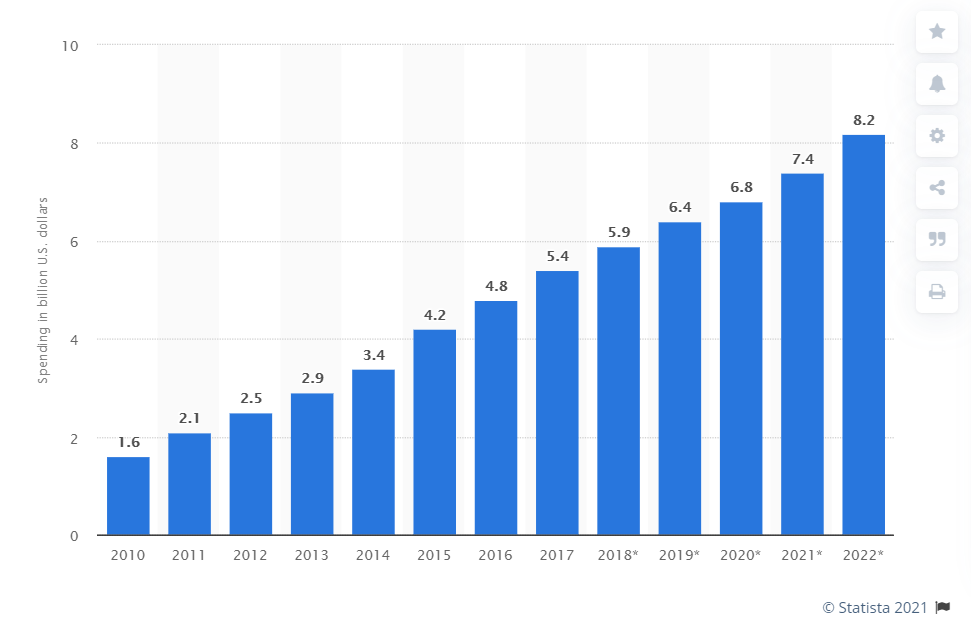Affiliate marketing has become mainstream in just about every branch of business, offering a new way to promote your brand, generate income, and connect with your customers. And boy, is business booming right now.
An incredible 84% of business owners are turning to affiliate marketing in search of new opportunities to drive revenue to their sites and opening up various engagement channels with their audience. In fact, the spending for affiliate marketing is expected to reach 8.2 billion dollars by 2022, and that’s only considering data from the US.

But are affiliate programs really all that they are made out to be, or will they do your business more harm than good?
What is affiliate marketing?
Affiliate marketing is a performance-based marketing model that businesses use as a low-risk and low-cost method of increasing brand recognition, traffic, and revenue. Through advertising a business’s goods and/or services to their audience, a publisher (also known as an affiliate) drives revenue for the publisher on a commission-based structure.
In most cases, the affiliate supports a product or service by sending traffic to the retailer’s website with a unique link that identifies them as the referrer. Following that, future sales would be counted against the affiliate’s commission. Usually, the commission fees are paid as a percentage share of any sale or as a fixed amount that has been agreed upon in advance.
With that in mind, let’s take a look at the pros and cons of implementing affiliate marketing into your business.
The Good
Opens up new revenue streams and boost sales
One of the best parts of setting up an affiliate program is gaining access to a new *untapped* audience. Depending on your company’s size, many of the affiliates you partner with will be introducing your brand to their audience for the first time, which is great exposure for your business.
Additionally, a good affiliate will increase sales and drive more conversions to your business without requiring you to spend much time or resources on developing your own marketing materials. Even bigger brands such as Lacoste have found massive success with affiliate marketing, as they reportedly obtained a 70 percent higher ROI due to Rakuten’s affiliate strategy.
Minimal upfront cost
Setting up an affiliate program is usually low-cost and relatively straightforward for most companies. It can be as simple as giving a publisher a tracking link to your product and supplying them with a few branded graphics and email templates to help them attract consumers.
Fortunately, you don’t have to go out and find affiliates yourself. Many businesses charge a low subscription fee and give you immediate access to a wide range of publishers that are looking for new work.
High-income potential
Seeing as all of the heavy liftings is being done by the affiliates, it becomes much easier to scale your operation and increase your output if you find a winning formula. It’s simply a matter of finding more affiliates to drive more sales. Remember, publishers are only rewarded if they produce results for your business, so there’s almost no financial risk to scaling this way either.
The Bad
Inconsistent results
Many of the affiliates you work with will be attempting to drive traffic for a number of companies on a daily basis. It’s doubtful they will be focusing solely on your business, making predicting the results of affiliate marketing challenging. Secondly, affiliates are not contracted to your company, so if they decide to move on to a different offer, take a vacation, or find a new job, that leaves you with one less revenue stream overnight.
Affiliates can damage the reputation of your company
It’s essential to do your due diligence on an affiliate’s marketing activities when you collaborate with them. If they have a history of engaging in unethical practices such as misleading ads, spamming email lists, or failing to comply with GDPR, for example, having your brand name associated with them will be detrimental.
Jesse Willms, who has sold over half a billion dollars worth of products using affiliate marketing strategies encountered a similar problem with his earlier businesses when selling a collection of weight loss products:
“Affiliates would often make false claims in their marketing campaigns before bringing users to our site. These claims would often be in the form of fake news sites, or sometimes even claiming Dr. Oz or Oprah endorsed the product. Affiliates would also sometimes steal credit cards and then purchase on our site. They greatly hurt our reputation.”
This goes to show the importance of recruiting the right affiliates and protecting your brand image. Ensure you take the time to vet your applicants and only accept those with a proven track record and significant experience in the industry. Of course, this may cost you more, but it’s worth it.
Even though affiliate networks have requirements that publishers must follow to become affiliates, this doesn’t always guarantee they are all “above board.” At the end of the day, if there is money to be made, there is always someone who will cut corners and advocate your brand negligently.
Final Word
Despite the apparent drawbacks listed above, affiliate marketing is still a fantastic tool for driving new customers to your business and boosting sales. A good affiliate will help increase your revenue, but they will increase your brand recognition in your industry, which will build authority and trustworthiness. Just make sure you conduct thorough due diligence when selecting who you work with.



 Bitcoin
Bitcoin  Ethereum
Ethereum  Tether
Tether  XRP
XRP  Solana
Solana  USDC
USDC  TRON
TRON  Cardano
Cardano  Lido Staked Ether
Lido Staked Ether  Avalanche
Avalanche  Toncoin
Toncoin